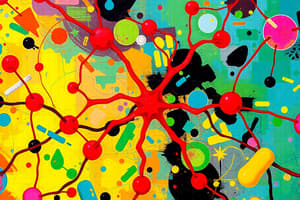Podcast
Questions and Answers
What characterizes the state of addiction to a drug?
What characterizes the state of addiction to a drug?
- Ability to abstain from the drug for extended periods
- Improved cognitive functioning when using the drug
- A strong preference for certain social activities
- A need to have the drug, regardless of negative consequences (correct)
Which of the following is NOT a criterion for diagnosing a drug use disorder?
Which of the following is NOT a criterion for diagnosing a drug use disorder?
- Continuing drug use despite social problems
- Spending excessive time obtaining or using the drug
- Engaging in recreational sports and activities (correct)
- Experiencing tolerance to the drug
What is meant by tolerance in the context of psychoactive drug use?
What is meant by tolerance in the context of psychoactive drug use?
- A temporary relief from withdrawal symptoms
- Experiencing cravings for the substance
- An increased dosage needed to achieve desired effects (correct)
- Using the substance to improve work performance
What is a key effect of depressants on the nervous system?
What is a key effect of depressants on the nervous system?
Which of the following describes the withdrawal symptoms associated with psychological dependence on a drug?
Which of the following describes the withdrawal symptoms associated with psychological dependence on a drug?
Flashcards are hidden until you start studying
Study Notes
Substance Use Disorder Criteria
- Substance use becomes problematic when individuals use more or for longer than intended.
- Significant time is spent acquiring, using, or recovering from substance effects.
- Intense cravings for the substance are experienced.
- Diminished control is evident, as substance use disrupts work, school, or home life.
- Continued use persists despite negative social consequences.
- Social, recreational, and work activities are reduced due to substance use.
- Tolerance develops, requiring increased amounts for the same effect.
- Withdrawal symptoms occur upon cessation of use.
Psychoactive Drugs & Dependence
- Psychoactive drugs alter perceptions and moods by affecting the nervous system.
- Tolerance is the diminished effect of a drug with repeated use of the same dose.
- Addiction is the compulsive need for a substance despite negative consequences.
- Withdrawal is the discomfort and distress following cessation of drug use.
- Physical dependence involves the body needing the substance to function normally, leading to withdrawal upon stopping.
- Psychological dependence is characterized by intense cravings for the drug, often for relief from negative feelings.
Categories of Psychoactive Drugs
- Psychoactive drugs broadly categorized into depressants, stimulants, and hallucinogens, each affecting the nervous system and impacting perception, mood, consciousness, cognition, or behavior.
Depressants
- Depressants reduce nervous system activity and slow body functions.
Alcohol: A Depressant
- Alcohol slows brain activity, impairing judgment and inhibitions.
- It slows sympathetic nervous system activity.
- Effects include slowed reactions, slurred speech, and impaired skills (e.g., driving).
- Memory disruption is a common consequence.
- Adolescent binge drinking can lead to nerve cell death, reduced neurogenesis, and impaired synaptic connections.
- Alcohol reduces self-awareness and self-control.
- Negative long-term effects include depression, memory loss, organ damage, impaired reactions, and death.
Studying That Suits You
Use AI to generate personalized quizzes and flashcards to suit your learning preferences.




